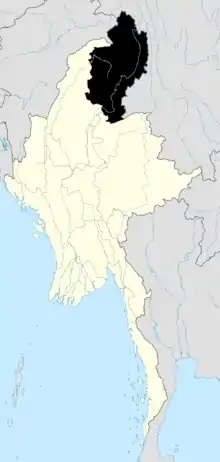Hpakant
Hpakant (Burmese: ဖားကန့်, Burmese pronunciation: [pʰá ga̰ɰ̃]; also Hpakan and Phakant) is a town in Hpakant Township, Kachin State of the northernmost part of Myanmar (Burma). It is located on the Uyu River 350 km north of Mandalay in the middle of one of the world's most inhospitable and malaria infested jungles, cut off for several months a year during the monsoons. It is famous for its jade mines which produce the world's best quality jadeite.[2][3]
Hpakant
ဖားကန့် | |
|---|---|
Town | |
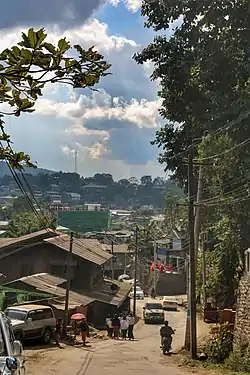 | |
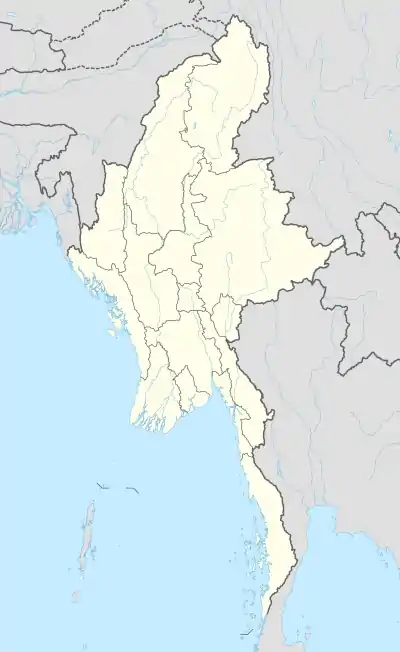 Hpakant Location in Myanmar (Burma) | |
| Coordinates: 25°37′0″N 96°19′0″E | |
| Country | |
| Division | |
| District | Mohnyin District |
| Township | Hpakant Township |
| Population | |
| • Town | 312,278 |
| • Urban | 60,123 |
| • Rural | 252,155 |
| • Religions | Buddhism Christianity |
| Time zone | UTC+6.30 (MMT) |
History
The word Hpakant comes from the Shan language words for rock fall. Hpakant was first established in 1832 as a village but shortly afterwards the village was destroyed in a landslide. Thereafter, Hpakant was established for the second time in 1836.
In 2011, fighting broke out between the Kachin Independence Army and the Myanmar Army in the area around the Hpakant jade mines, displacing an estimated 90,000 people by September 2012 and killing hundreds of others.[4]
Political economy
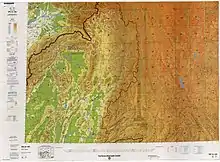
Like an old mining town of the American West, Hpakant has been dubbed "the wild wild east" replete with alcohol, gambling, prostitution, and opium dens. Since after the Kachin Independence Army (KIA) came into the area before negotiating a ceasefire agreement with Burma's military government in the early 1990s, heroin is no longer openly on sale on the streets of Hpakant. Both addicts and drug dealers were rounded up, taken to the nearby Uru River, shot and dumped in the river.[3]
Concerns have been expressed regarding the encroachment on and destruction of the environment from deforestation and landslides resulting from mining activities and consequent flooding. The Uru River has also been affected by the dumping of soil. There have been instances of locals being forced to leave their homes when upland areas were bulldozed by the big mining companies.[5]
The KIA however lost control of the jade mines once the ceasefire had been arranged, and firms from China, Hong Kong and Singapore started to operate in the area after winning concessions from the government.[6] More recently however the mining contracts went to the well known Burmese tycoon Tay Za's Htoo Group and also to Myanmar Dagaung Co Ltd, a subsidiary of the Hong Pang Group headed by Wei Hsueh-kang, a former drug trafficker and leader of the Wa insurgent group UWSA turned entrepreneur after the cease-fire deal.[7]
Maran Brang Seng, former chairman of the Kachin Independence Organisation (KIO) from 1976 until he died in 1994, was born in Hpakant in 1930.[8]
Mining hazards
One thousand miners apparently drowned in 2000 when flood waters of the Uru River rushed into the underground mines, but the news was hushed up by the authorities according to the locals. An explosion at Hpakant Gyi mine on New Year's Eve 2008 killed 2 miners and injured 7. It is owned by another one of the ethnic ceasefire groups, the Pa-O National Army (PNA) headed by Aung Kham Hti.[9]
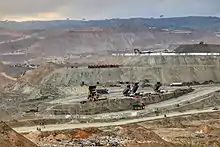
More than 30 (and up to 70) people are believed to have been killed in a massive landslide near Hpakant in early July 2009; official figures are not available. The flood waters swept away homes, blocked roads and cut communications. The disaster is being blamed on jade mining, which creates large deposits of debris that block heavy rain from reaching natural rivers and drainage, including the Uru river.
About 100 jade mining companies operate in the Hpakant area. The Kachin Environmental Organization, based on the Sino-Burmese border, says that people living in the Hpakant area had appealed to the companies not to dump waste near the Uru River and to avoid environmental damage. The companies enjoy government backing, however, and local complaints are regularly ignored.[10]
Over 100 people were killed in a landslide in the 22 November 2015 Hpakant jade mine disaster. Most of those killed were people living near the waste heap, who made their living scavenging through waste soil looking for jade remnants. At least 15 jade-seekers in a closed mine were killed and 45 injured by a landslide in July 2018.[11] Six people were killed in the 22 April 2019 Hpakant jade mine collapse. More than 162 people were killed in a landslide in the 2 July 2020 Hpakant jade mine disaster.[12]
Notes
- Census Report. The 2014 Myanmar Population and Housing Census. 2. Naypyitaw: Ministry of Immigration and Population. May 2015. p. 17.
- "Hpakan Other Rock Mine (Myanmar)". aditnow.co.uk. Retrieved 26 December 2008.
- Richard W. Hughes and Fred Ward. "Heaven and Hell: The Quest for Jade in Upper Burma". Ruby-Sapphire.com. Retrieved 26 December 2008.CS1 maint: uses authors parameter (link)
- Democratic Voice of Burma, Displaced by fighting, villagers take shelter in Hpakant, 22 October 2012, http://www.dvb.no/news/displaced-by-fighting-villagers-take-shelter-in-hpakant/23955
- Violet Cho. "Gem Mining Destroying Environment, Activists Say". The Irrawaddy 25 June 2008. Archived from the original on 27 June 2008. Retrieved 26 December 2008.
- John S. Moncreif and Htun Myat. "The War on Kachin Forests". The Irrawaddy October 2001, vol 9, no 8. Archived from the original on 20 September 2010. Retrieved 26 December 2008.CS1 maint: uses authors parameter (link)
- "Te Za mines jade with sophisticated equipment in Phakant". KachinNews.com, 5 July 2007. Retrieved 6 January 2009.
- "Kachin's Anti-Government Forces". Kachinstate.com. Retrieved 6 January 2009.
- "Two miners killed, seven injured on New Year eve explosion in Hpakant mine". KachinNews.com, 7 January 2009. Retrieved 11 January 2009.
- "Many Die as Landslide Sweeps through Jade-mining Area". web.archive.org. 11 August 2010.
- Viele Tote bei Erdrutsch in stillgelegter Mine in Myanmar orf.at, 16 July 2018, retrieved 16 July 2018 – German.
- "Myanmar jade mine landslide kills more than 100". BBC. 2 July 2020.
External links
- Satellite map Maplandia.com
- Sources of Jadeite Jade Geohavens
- Burmese Jade: The Inscrutable Gem Palagems.com
- Journal of the Geological Society, Sep 2004 Morley, C K
- Mandalay-Myitkyina train times

